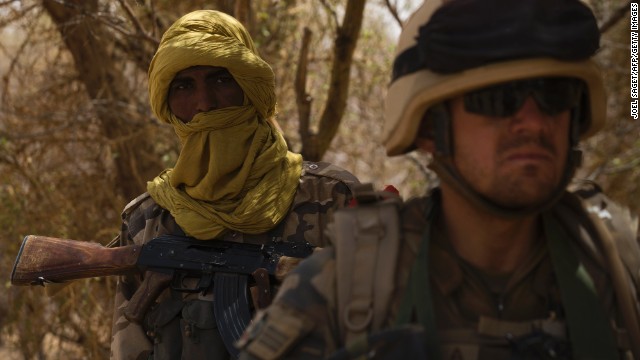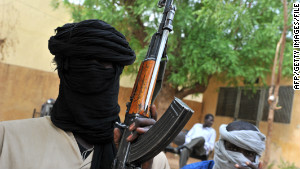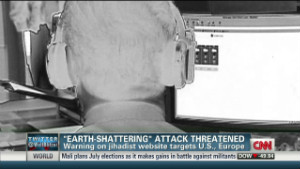Spain arrests 2 men suspected of al Qaeda group links
April 23, 2013 -- Updated 1421 GMT (2221 HKT)

A member of the Malian special forces and a French soldier on April 10, 2013, north of Gao, Mali.
The Interior Ministry
identified the suspects as Nou Mediouni, 23, from Algeria, who was
arrested in the north-central city of Zaragoza, and Hassan El Jaaouani,
52, from Morocco, who was detained in the southeastern city of Murcia.
'
Spanish police worked
with their counterparts in France and Morocco to carry out the latest
arrests, an Interior Ministry statement said.
The two suspects have a
"profile" that is similar to the two suspects in the Boston Marathon
attacks, the statement said. Interior Minister Jorge Fernandez Diaz told
reporters that police consider them "lone wolves," like the Boston
suspects.
-

Al Qaeda in Mali behind Algeria attack
'

Al Qaeda threatens more attacks
'

Why Mali matters: al Qaeda on the rise
-
However, the similarity
is based only on how the two suspects in Spain were "radicalized," by
going to online forums and chat rooms, and also in the suspects' alleged
interest in pulling from the Internet information on bomb-making, said
an Interior Ministry spokesman, who by custom is not identified.
. .
The pair, who are from
different countries, are not brothers and, unlike the two suspects in
the Boston Marathon attacks, have no roots in the Caucasus region, he
said.
But Fernandez said one of
the suspects recently praised the Boston attacks. A second Interior
Ministry spokesman said that was the younger suspect, Mediouni.
Both of the suspects in
Spain are unemployed, the second Interior Ministry spokesman said.
Mediouni, arrested in Zaragoza, studied computer sciences but had not
worked professionally in that field, the ministry statement said.
The two are suspected
members of a radical cell close to the terrorist organization al Qaeda
in the Islamic Maghreb, the Interior Ministry said.
.
The two men have been
under surveillance as part of an operation lasting more than a year run
in cooperation with France and Morocco, the Spanish Interior Ministry
said.
The Madrid train
bombings in March 2004, which killed 191 people and wounded more than
1,800, led to a sharp increase in Spain's fight against Islamic
terrorism. The courts convicted 14 Islamic militants for their role in
the bombings, along with four Spaniards convicted for trafficking in
explosives used in the attacks.
Since then, authorities
have told CNN that Spain has assigned hundreds of additional police
officers to investigate Islamic terrorism and added dozens of Arabic
translators, so authorities will be able to understand communications
and threats. Around 400 suspected Islamic militants have been arrested
in Spain since March 2004, although many have been released by judges
for lack of evidence.
'
Mali extremist contacts alleged
Mediouni was identified
and recruited by Mali-based members of al Qaeda in the Islamic Maghreb
through his interest in radical Islamist Internet sites, the Interior
Ministry statement alleges.
He was given specific
instructions for a trip to a jihadist camp in northern Mali led by the
group, the Interior Ministry claims, but was unable to meet with AQIM
leaders because of the heightened security presence in the area.
Since January, France
and nearby African nations have been supporting Malian forces in their
efforts to push back Islamist extremists who carved out a large haven in
northern Mali last year.
El Jaaouani is also
alleged to have established contact with AQIM leaders in Mali and to be
responsible for recruiting radicals in Spain. One of the people he
contacted was directly involved with the kidnapping and murder of two
French citizens in Niger in January 2011, the Spanish Interior Ministry
said.
The two suspects' homes
were being searched by police, the statement added. They are due to be
arraigned Thursday at the National Court in Madrid, which handles
terrorism cases, a court spokeswoman said.
The arrests in Spain come days before the Madrid Marathon on Sunday.
About 26,000 runners are
expected to take part in a marathon, half-marathon and 10-kilometer
race, to be run at the same time. Security has been increased in light
of the attacks in Boston, authorities said.
'
-
CNN's Claudia Rebaza and Laura Smith-Spark contributed to this report.

No comments:
Post a Comment